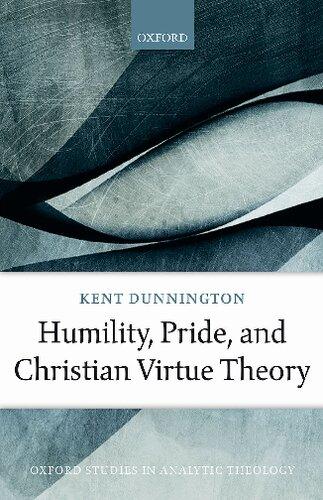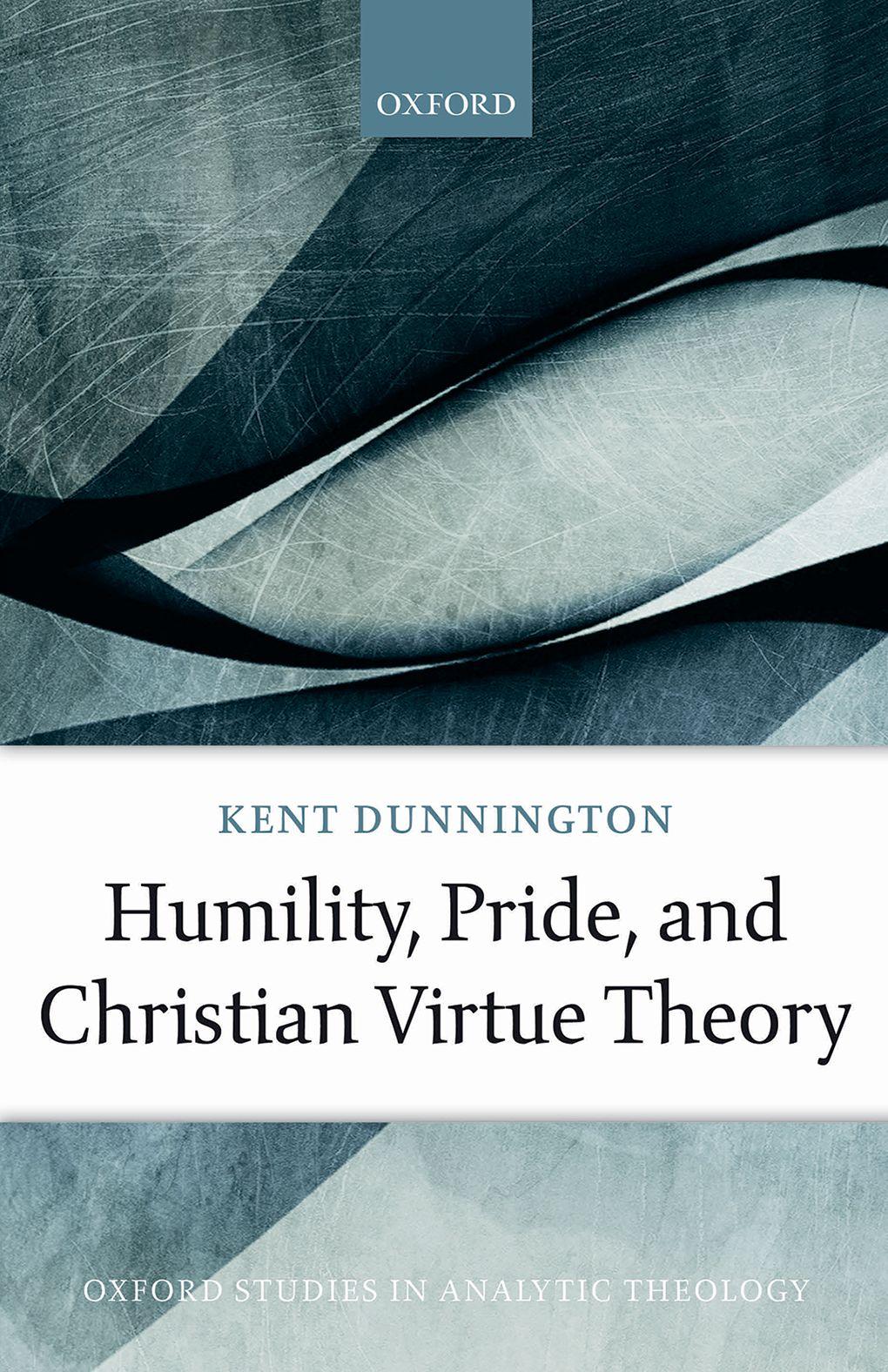Humility,Pride, andChristian VirtueTheory
KENTDUNNINGTON
1
GreatClarendonStreet,Oxford,OX26DP, UnitedKingdom
OxfordUniversityPressisadepartmentoftheUniversityofOxford. ItfurtherstheUniversity’sobjectiveofexcellenceinresearch,scholarship, andeducationbypublishingworldwide.Oxfordisaregisteredtrademarkof OxfordUniversityPressintheUKandincertainothercountries
©KentDunnington2019
Themoralrightsoftheauthorhavebeenasserted
FirstEditionpublishedin2019
Impression:1
Allrightsreserved.Nopartofthispublicationmaybereproduced,storedin aretrievalsystem,ortransmitted,inanyformorbyanymeans,withoutthe priorpermissioninwritingofOxfordUniversityPress,orasexpresslypermitted bylaw,bylicenceorundertermsagreedwiththeappropriatereprographics rightsorganization.Enquiriesconcerningreproductionoutsidethescopeofthe aboveshouldbesenttotheRightsDepartment,OxfordUniversityPress,atthe addressabove
Youmustnotcirculatethisworkinanyotherform andyoumustimposethissameconditiononanyacquirer
PublishedintheUnitedStatesofAmericabyOxfordUniversityPress 198MadisonAvenue,NewYork,NY10016,UnitedStatesofAmerica
BritishLibraryCataloguinginPublicationData Dataavailable
LibraryofCongressControlNumber:2018959176
ISBN978–0–19–881839–7
PrintedandboundinGreatBritainby ClaysLtd,ElcografS.p.A.
3
Tomymother,Paula Andmygrandparents,VelvaandMarvin
Preface
Inamemoirpublishedshortlyafterhisdeath,PaulKalanithirecounts his finaldaysasayoungphysicianfacingterminalcancer.Diagnosed at35withstageIVmetastaticlungcancer,Kalanithistrugglesto understandwhatcouldmakehisshortenedlifeworthwhile.The memoirislacedwithreflectionsonidentity,forKalanithidiscovers thathisillnessthreatenshimwithmeaninglessnessbysabotagingthe storyofPaulKalanithithebrilliantyoungneurosurgeon.
Onechapterofmylifeseemedtohaveended;perhapsthewholebook wasclosing.Insteadofbeingthepastoral figureaidingalifetransition, Ifoundmyselfthesheep,lostandconfused.Severeillnesswasn’tlifealtering,itwaslife-shattering....Mylifehadbeenbuildingpotential, potentialthatwouldnowgounrealized.Ihadplannedtodosomuch, andIhadcomesoclose.Iwasphysicallydebilitated,myimagined futureandmypersonalidentitycollapsed,andIfacedthesameexistentialquandariesmypatientsfaced.(Kalanithi2016:120)
Kalanithiisparalyzedbyaninabilitytoformulateanewidentitythat couldmakeintelligiblehisremainingtime.
WhowouldIbe,goingforward,andforhowlong?Invalid,scientist, teacher?Bioethicist?Neurosurgeononceagain,asEmma[hisdoctor] hadimplied?Stay-at-homedad?Writer?Whocould,orshould,Ibe? (Kalanithi2016:147)
Kalanithi’sdescriptionoftheneedtoknowwhohecouldandshould beinordertogoonisadescription inextremis oftheprocess wherebyallofus,ornearlyallofus,attempttomakemeaningful storiesofourlives.Weprojectontoourfuturesomepictureoftheself wecouldandwouldbe,andthatpictureorientsthesignificant decisionsofourlives.Wearesowellversedinthisprocessthatit usuallygoesunnoticed,buttheformulation,rehearsal,andmanagementoftheseself-idealstakesupmuchofourmoralenergy.The slightestalterationinourperceivedpossibilitiestriggersalightningfastadjustmenttothepictureofwhowecouldandshouldbe,such adjustmentseeminglyrequiredforustogoon.Moresignificant alterations arejectionletterinthemail,anunexpectedpregnancy,
acareer-endinginjury,abrokenengagement canderailusmuch longer,sinceourpictureofwhoweareandwillberequiresfarreachingrevisionifitistosustainourfuture.Insevereinstances chronicorterminalillness,thebetrayalofaspouse,thelossofa child ourself-idealissocompletelyshatteredthatwecannotmove forward,wanderinginsteadinawastelandofconfusion.Thisperpetualefforttoconstructforourselvesasenseofwhoweareandmight beIcall “thequestforidentity.”
Ihaveforsometimethoughtofthisquestforidentity,inevitable thoughitmayseem,asmainlyatemptation.Ihavethoughtofit, indeed,astheheartofpride.Ihavethoughtoftheseself-ideals,which aresoabruptlysnatchedfromusbythethievesoffortuneandwhich wesoassiduouslyremake,aslikethegarmentsintheGardenofEden: pitifulattemptstocoverournakedness;necessary,perhaps,givenour condition,butartifactsofourmiserynonethelessandsusceptibleas allsuchearthlytreasurestobedevouredbymothsandhollowedout byrust.Ihavethoughtthatwewillmostcertainlybefreedfromthe questforidentityifourfutureisinGod,andthatwemighttastethat futureevennowjusttotheextentweabandonourselvestoGod. IlearnedtothinkthiswayfromtheChristiansaints,monks,mystics, andmartyrsthatappearinthepagesofthisbook,but,longbefore Ihadencounteredthem,Ilearnedtothinkthiswayfromthesaints whoraisedme.
Icanstillrememberthe firsttimeIgavemy “testimony.” Inthe littlechurchesthatnourishedmychildhoodfaith, fledglingdenominationalsplinteringsoftheWesleyan–Holinessmovement, Wednesday-nightserviceswerefortestimonies.Forayoungchild, goingtothealtarmeant “gettingsaved,” butstandingfromthepewto giveapersonaltestimonymeantyouweregettingseriousabout walkingwithGod.Thepeoplewhoinstructedmeinthefaithloved totestifytotheirexperienceofGodintheirlives,buttheyotherwise sharedlittleabouttheirinnerlives.Mymotherandmymaternal grandparents thesaintswhoraisedme,towhomIdedicatethis book arenoteasilybroughttoextendedruminationsontheirsubjectivity,except,again,todescribehowtheSpiritisatworkinthem. Inthisrespect,theyresembletheearlyChristiansaintAugustine,one ofmymainconversationpartnersinthisbook,sometimesmistakenly calledthefatherofthemodernmemoirorautobiography.Sucha descriptionisamistake,forAugustinehadnointerestinexploring
viii Preface
hispersonalsubjectivity,exceptasawayof findinghislifeinGodand findingGodpresentinhislife.
Ourcultureisopposedtoanysuchreticenceaboutpersonal subjectivity.Wecanthinkoflittlemoreinterestingthanthequest foridentity,whichiswhyquintessentiallymodernnovels,asPaul Griffiths(2014:226)observes, “occuralmostentirelyonthestageof theircharacters’ innertheater.” Assuch,modernreadersaretypically alittledisappointedbyAugustine’ s Confessions.Wethinkitwould havebeenmoreinterestingifithadnotbeenwrittenasaprayer.
Althoughtheywouldnothaveputitintheseterms,Ilearnedfrom thesaintswhoraisedmethatmyhopeshouldbetomakeofmylifea prayer,whichistosay,athingtransparenttoGod,inwhichthereis no “I” thatcouldstandinthewayofGod’slight.Itisnoaccident, Ithink,thatIlearnedthisintheWesleyantradition.In APlain AccountofChristianPerfection,Wesley(1872:113)writes:
Forwhatisthemostperfectcreatureinheavenorearthinthypresence, butavoidcapableofbeing filledwiththeeandbythee;astheairwhich isvoidanddark,iscapableofbeing filledwiththelightofthesun,who withdrawsiteverydaytorestoreitthenext,therebeingnothinginthe airthateitherappropriatesthislightorresistsit.
IammodernenoughthatIstruggletodelightinWesley’svision,let alonewholeheartedlytodesireit.Iamsomewhatappalledbyit. IsuspectIamnotalonehere.Isn’ttheresomethingrightandgood aboutKalanithi’swishtoforgeanewandworkableidentity?Isn’t theresomethingabit too humble,indeedabitservile,inWesley’ s apparentreadinesstodisappear?ThereaderwillseethatIsharethese questions.Indeed,muchofthebookengagesaseriesofpowerful modernandcontemporarydefensesof “properpride” asalimit placeduponhumility.Nevertheless,Icannotshakethesensethat Wesleyisright,thatthereisnosuchlimit,andthatwhatWesley describesherewouldbethehopeofsomeonecharacterizedbyfull humility.Thisbookisanefforttoputsucharadicalperspectiveon humilityintoconversationwiththebestmodernandcontemporary thoughtabouthumility.Thosewhoaresuspiciousoftheradical perspectivesuggestedherewill findmuchtointeresttheminwhat follows.
Ibegantoworkoutsomeofthebook’sideasandargumentsinthe followingarticles: “Humility:AnAugustinianPerspective,” ProEcclesia,25/1(2016),18–43; “IsThereaChristianVirtueEpistemology?”
ix
Preface
ResPhilosophica,93/3(2016),637–52;and “IntellectualHumilityand theEndsoftheVirtues:ConflictingAretaicDesiderata,” Political Theology,18/2(2017),95–117.
Manypeoplehavehelpedmewritethisbook.Ibeganstudying humilityoverthespanoftworesearchfellowships,oneatStLouis UniversityandoneatBiolaUniversity,bothofwhichwerefundedby theJohnTempletonFoundation.MattFriseandEleonoreStump wereespeciallyencouragingatStLouisUniversity,andStephen Parduehasbeenahelpfulconversationpartnereversinceourtime togetherasfellowsatBiola.Ibenefitedfromasummerseminarat CalvinCollege,alsofundedbyTempleton,whereKyleBennett,Craig Boyd,NathanCarlson,AaronCobb,RebeccaDeYoung,Kevin Timpe,JamesvanSlyke,andRonWrighteachofferedcomments ondraftsofearlieressaysonhumility.Severalofmycolleaguesat Biolahaveinteractedwithpartsofthisbook,includingDavidCiocchi,DougGeivett,PeteHill,MattJenson,AdamJohnson,Ryan Peterson,andMelissaSchubert.TomCrispandGreggTenElshof havebeenespeciallyinspiringcolleaguesandfriendsatBiola,and IthankthemalongwiththerestoftheSealBeachroundtablewho tooktimetoreadandcommentonportionsofthebook:JasonBaehr, MichaelPace,StevePorter,andDanSpeak.Mybestfriend,Ben Wayman,asusual,readeveryword,offeringhelpfulcommentsand consistentencouragement.StanleyHauerwas’sinfluenceonmy approachwillbeevident,andIamgratefulforhissupportand direction.BobRobertswasasortofelderstatesmenofmanyofthe Templeton-fundedprojects,andtheopportunitytolearnfromhim hasbeenoneofthehighlightsofthelastfewyears.Iinteractwith Bob’sworkinthisbookmorethanwithanyothercontemporary scholar’s.Althoughmyengagementwithhisviewsissometimes critical,itshouldbeclearthatIthinkhisworkonhumility(and properpride)isthemostnoteworthy.
Finally,whilewritingthisbookImet,andcourted,andproposed to,andmarriedmywife,Rachel.ToRachel,andourdaughter, Gemma:thankyouforopeningyourheartsandyourlivestome, forbelievinginme,andforsurprisingmewithsomuchhappiness. Whatanunimaginablegift.
x Preface
Contents Introduction:ToGoAgainstSelf1 1ForgettingChristianHumility11 2RememberingChristianHumility29 3MundaneHumility47 4RadicalChristianHumility71 5Humility’sDestiny95 6HumilityanditsDiscontents117 7BecomingHumble137 Conclusion:TheTaskofChristianVirtueTheory157 References 165 IndexofNames 171 IndexofSubjects 173
Introduction
ToGoAgainstSelf
ThisbookoffersanaccountofChristianhumility.Morespecifically, itoffersaninterpretationofthedominantstreamofthoughtand practiceabouthumilityinearlyChristianity.TheChristiantradition is,ofcourse,notunanimousinitsviewofhumility,andlate-medieval treatmentsofhumilityoftendilutethemorerevolutionaryearly Christianviews.Istickresolutelytotheearlyandmostradicalstrand ofChristianthinkingabouthumility,whichisfoundespeciallyin Augustineandtheearlymonastictradition,usingtheirmostextreme statementsasatestcasefortheaccountbeingdeveloped.Throughout thebookIusethedescriptor “radicalChristianhumility” asawayof signalingthisstreamofthetradition.
MygoalistoprovideanaccountofwhatmostearlyChristians tookhumilitytobe.Itis not mygoaltoinvalidateotheraccountsof humilityoreventoshowtheirinferiority.Theexerciseiscomparative,butonlyforthepurposeofbringingintostarkerreliefthe distinctivenessofaparticularearlyChristianvision.Thereaderwill beconfusedanddisappointedifsheislookingforadefinitionof humilitythatwillsilenceeveryotherandincorporateeveryconceivableintuitionaboutwhatcountsasauthentichumility.Thereare manyconceptsofhumility,bearingfamilyresemblances.Perhapsone ofthemlatchesontowhat real humilityis,perhapstheyallmissthe markinsomeimportantrespect.Iamnotinterestedintryingto defendanaccountofradicalChristianhumilityagainstanyalternativeaccount.IamsimplyinterestedingettingradicalChristian humilityintoclearview.
Thisinterestwassparkedbymyattempttounderstandcontemporary (mostlyanalytic)philosophicaltreatmentsofhumilityalongside earlyandmedievalChristiancommentaryonhumility.Tryingto bringthesetwobodiesofliteratureintofruitfulconversation convincedmethatearlyChristiannotionsofhumilityareobscuredby mostcontemporaryphilosophical theorizing.Sayingthatcontemporaryphilosophicalaccountsofhumility “ obscure” earlyChristian understandingsisdifferentthansayingthey “reject ” earlyChristian understandings.Many,indeedmost,contemporaryphilosophical accountsofhumilityquiteself-consciouslyrejectwhatistaken tobetheChristianviewofhumility,eventhoughtheyadmitthat Christianityisresponsibleformakinghumilityacentralvirtueof themorallife.Whatistakenbythesecontemporarytheoriesto betheChristianviewofhumilityisnot,however,theChristian view,atleastnotinitsearliestandmostoriginatingarticulations. AsChapter1shows,thephilosophicalstudyofhumilityishampered byhistoricalforgetfulness.Therearemanyreasonsforthatforgetfulness,butamongthemthre earemostdeterminative.
First,earlyChristiantextsdonotoffer “accounts” ofhumilityin thephilosophicalsense;theydonotsetastheirprimarygoaltheclear analysisofaconceptortheprecisearticulationofthecoredisposition ofavirtue.EarlyChristiansweremoreconcernedtoenjoin,teach, andnarrativelydisplaythevirtuesthantheyweretodefineorcarefullydelineatethem.Bycontrast,contemporaryvirtueethicsis mostlyconfinedtotheofferingofsuchaccounts.WhencontemporarytheoristslooktotheChristianpastforanaccountofhumility, they findonlyanassortmentofsayingsthatcantooeasilybepressed intosomevariantofacontemporaryview.Itoftenturnsoutthat Christianhumilitysomisconstruedistheperfectfoiltowhatever viewisbeingsetforth.Itakeadifferentapproach,beginningwiththe (oftenstrange)thingsthatweresaidabouthumilityandthe(often strange)practicesthatwerethoughttoconducetohumilityinearly Christiantradition,andworkingfromtheretodevelopanaccountof radicalChristianhumility.
Second,becauseofwhatcouldbeassumedbyitsintendedaudience,mostearlyChristiancommentaryonhumilitydoesnotmake explicitthetheologicalcommitmentsthatunderwritetheviewof humilitybeingexpressed.Thisisespeciallytrueintheearlymonasticliterature,whereevenscripturalsupportissparse,letalone extendedtheologicalrumination.Iargue,however,thatthemost
2
Humility,Pride,andChristianVirtueTheory
distinctivethemesofearlyChristiantheology specificallythecruciform characterofsalvationandthetriunityofGod underwritetheradicalstrandofearlyChristianthinkingonhumility.Becausehumility wassobuttressedbytheologicalconvictions,itisappropriateto talkspecificallyof Christian humility.Theaccountofhumilityset forthheremakeslessandlesssensethemoreitisabstractedfrom asetoftheologicalcommitmentsuniquetotheChristiantheological tradition.
And,third,theinfluenceofmodernmoralthought,especially DavidHume’s,onourintuitionsabouttheproperrelationship betweenhumilityandprideissodecisivethatwemodernscanhardly believewhatearlyChristianssaidabouthumility,orelseweassume theymusthavebeenperverse.BecauseofHume’sinfluence,thisbook focusesonthecategoryof “properpride” morethanIoriginally envisioned.Significantportionsofthebookinteractwiththebest contemporarydefenseofproperpridefromaself-consciouslyChristianperspective.Ichallengethedominantcontemporaryintuition accordingtowhichanyaccountofvirtuoushumilitywillrequirea counterbalancingaccountofproperpride,althoughIsharetheset ofconcernsthatunderwritethisintuition,concernspowerfully expressedinfeministandwomanistcritiquesofthelegacyofChristianhumility.Ishowhowonecantakethoseconcernsseriously withoutrejectingaradicalChristianunderstandingofhumility.
ItisbecausetheradicalChristianapproachtohumilityisso discordantwithmodernassumptionsaboutvirtueanditsrelation tohuman flourishingthatmyargumenthasthepotentialtodisplay thedifferenceChristmakestothewayChristiansconceiveofthe morallife.Eventhoughthebookisanefforttoreclaimatraditionof thoughtabouthumilitythatisobscuredbycontemporaryphilosophicalvirtuetheory,Iinteractwithvirtuetheorythroughout.Some theologicalcommentatorsallegeitisamistaketothinkofhumility asavirtue,ortoapproachquestionsaboutthenatureandvalueof humilityfromtheperspectiveofvirtueethics(Louf2000;Foulcher 2015).Iunderstandtheworry:thereisindeedaprofoundtension between,ontheonehand,theeudaimonismthatframesclassical thoughtaboutthevirtuesand,ontheotherhand,theseverelyselfsacrificialdimensionsofearlyChristianhumility.Abandoningthe fieldofvirtueethicsforasupposedlypuretheologicalapproachisa mistake,however,becauseitcordonsoffphilosophicalwisdomfrom theologicalwisdomandtherebymissesanopportunitytoseehow
Introduction 3
Humility,Pride,andChristianVirtueTheory
Christmakesallthingsnew,includingourunderstandingsofvirtue, human flourishing,andhumandestiny.
Humilitynamesahumandispositionthatmanyhavethoughtcrucial forultimatehuman flourishing.Assuch,itisthenameofavirtue.Rather thanabandonthe fieldofvirtueethicsaltogether,Iprefertofollow Augustineandallowthisvirtuetheologicallyunderstoodtochallenge andunsettletraditionalphilosophicalwaysofthinkingaboutthemoral life.ByshowinghowinterestingitcanbetoputChristiantheologyin dialoguewithcontemporaryvirtuetheory,Ihopetoshowthatitisa mistaketoattempttocarryoutcontemporaryphilosophicalvirtue theoryinawaythatinsistsonthetraditionaldistinctionbetween theologyandethics.AlthoughIwillnotoftenstepbacktoaskbroader methodologicalquestionsaboutthe fieldofvirtuetheorygenerally,the conclusionofthebookwilldojustthat,andreaderswho findthemselves distrustfulofmyapproachshouldreadtheconclusionaheadoftime.
AlthoughAugustine’sisthedominantvoiceinthisbook,itwasthe livesandsayingsoftheearliestChristianmonks,thedesertmothers andfathers,thattriggeredmyoriginalsuspicionsthatwehavelost trackofradicalChristianhumility.Inthefourthand fifthcenturies ,Christians fledtotheEgyptiandesertsinsearchofhumility.They prizedhumilityasapreeminentvirtue:
AbbaOrsaid, “Thecrownofthemonkishumility.” (Ward1975:247)
JohntheDwarfsaid, “HumilityandthefearofGodareaboveall virtues.” (Ward1975:90)
Asthescripturallymandatedformofdiscipleship:
AbbaJohnoftheThebaidsaid, “Firstofallthemonkmustgain humility;foritisthe firstcommandmentoftheLordwhosaid: ‘Blessed arethepoorinspirit,fortheirsisthekingdomofheaven.’”
(Ward1975:106)
AbbaJohnofLycopolissaid, “ThetextofScripture says, ‘Whosoever humblethhimselfshallbeexalted.’ Andso,mychildren, firstofallletus disciplineourselvestoattainhumility,sincethisistheessentialfoundationofallthevirtues.” (Ward1980:59–61)
Andasthepathtosalvation:
AmmaTheodorasaid, “Neitherasceticism,norvigilsnoranykindof sufferingareabletosave,onlytruehumilitycandothat.”
(Ward1975:84)
4
AmmaSyncleticasaid, “Justasonecannotbuildashipwithoutnails,so itisimpossibletobesavedwithouthumility.” (Ward1975:235)
NoothercharactertraitmatteredmoretotheseearlydesertChristiansthanhumility.Theclassicalquartetofcardinalvirtues courage,temperance,prudence,andjustice arebarelymentioned intheirsayings.TheChristiantriooftheologicalvirtues faith,hope, andlove combinedarediscussedlessthanhumility.
Iftheywereextremeintheirprivilegingofhumility,thedesert mothersandfatherswereequallyextremeintheirformulationsofthe demandsofhumility.Theydidnotofferdefinitionsorphilosophical accountsofhumility,buttheyrecurrentlynotedfourpracticesthat bothengenderedandexpressedhumility.First,thepracticeof submission:
AbbaPoemensaid, “Donotdoyourownwill;youneedratherto humbleyourselfbeforeyourbrother.” (Ward1975:189)
AmmaSyncleticasaid, “Obedienceispreferabletoasceticism.[Asceticism]teachespride,[obedience]humility. ... Aslongasweareinthe monastery,wemustnotseekourownwill,norfollowourpersonal opinion,butobeyourfathersinthefaith.” (Ward1975:234)
Second,thepracticeofsteadfastnessunderphysicalsuffering:
AbrotheraskedAbbaCronius, “Howcanamanbecomehumble?” ... Theoldmansaid, “Inmyopinion,heshouldwithdrawfromall businessandgivehimselftobodilyafflictionandwithallhismight rememberthathewillleavehisbodyatthejudgementofGod.” (Ward1975:115)
TheoldmansaidtoAbbaJohntheDwarf, “Go,beseechGodtostirup warfaresothatyoumayregaintheafflictionandhumilitythatyouused tohave,foritisbywarfarethatthesoulmakesprogress.” Sohe besoughtGodandwhenwarfarecame,henolongerprayedthatit mightbetakenaway,butsaid, “Lord,givemestrengthforthe fight.” (Ward1975:88)
Third,thepracticeofquietlybearinginjustice:
Ahermitwasasked, “Whatishumility?” Hesaid, “Itisifyouforgivea brotherwhohaswrongedyoubeforeheissorry.” (Ward2003:163)
Abrothertookituponhimselftoacceptanychargemadeagainsthis community,sothatheevenaccusedhimselfoffornication.Someofthe monks,whodidnotknowthetruthabouthislife,begantomurmur againsthim,saying, “Thismandoesmuchwickednessandnowork.”
Introduction 5
Humility,Pride,andChristianVirtueTheory
Theabbot,knowingthetruth,saidtothebrothers, “Iwouldratherhave oneofhismatswithhumilitythanallyourmatswithpride.” (Ward2003:168)
And,fourth,thepracticeofself-abasement:
AbbaTithoessaid, “Thewayofhumilityisthis:self-control,prayer,and thinkingyourselfinferiortoallcreatures.” (Ward1975:237)
AbrotheraskedAlonius, “Whatishumility?” Thehermitsaid, “Tobe lowerthanbrutebeastsandtoknowthattheyarenotcondemned.” (Ward2003:158)
Insum,fortheseearliestChristianmonks,humilityisthefoundationalvirtueofChristiandiscipleship,essentialtosalvation,nurtured andexpressedthroughwillingsubmission,steadfastsuffering,silence underinjustice,andself-abasement.Fromtheperspectiveofmodern psychologyormoralphilosophy,suchanethicalregimeappears perverseinitsvalorizationofself-denial,self-sacrifice,andselfhatred.The Sayings and Lives ofthedesertmothersandfathers readlikeonelongassaultonthestable,secure,andsignificantself presupposedasnormativebymostmodernpsychologyandmoral philosophy.
Evagriussaid: “Togoagainstselfisthebeginningofsalvation” (Ward2003:153).Onitsown,thisisconventionalwisdom;moral formationrequiresself-opposition.Buttowhatend?Bothancient (Greek)andmodern(psychological)wisdomhasitthatproperselfoppositionisinservicetoamoreintegratedself.Bysuccessfully opposingsomeoftheirdesires,conflictedmoralagentsslowlyretrain their first-orderdesiresintoalignmentwiththeirsecond-order desires.Thisisnoprogramofwarontheselfperse;ratherwaris tobewagedonsomeaspectoftheself waywarddesire,for example thatinhibitstheefficientfunctioningoftheself.Theaim ofsuchself-oppositionis,therefore,betteralignmentbetweenreason anddesireinthepsycheand,correspondingly,moreharmoniousand securepersonalagency.
Thisisnotthekindofself-oppositionenvisionedbyEvagrius,or theotherdesertammasandabbas,however.Onesearchestheir sayingsinvainforanendorsementofanintegratedandpowerful self,orforanynotionthatthemonk’squestforhumilitymustbe counterbalancedbyameasureofproperprideandself-esteem.Their attacksontheselfarerelentless,andthereislittlediscerniblelimit
6
placedonthoseattacks.Forinstance, “Zachariastookhiscowlfrom hishead,andputitbeneathhisfeetandstampedonit,andsaid, ‘Unlessamanstampsuponselflikethat,hecannotbeamonk’” (Ward2003:153).
Whatistherecommendationhere?IsAbbaZachariasenjoining destructionoftheselfentirely?Thisappearstoleadtoparadox, forthepossessorofthevirtueofcompletehumilitywould,bydefinition,ceasetobeaself.Butvirtuesareattributesofselves,orsoit seems.Sothepossessorofhumilitywouldthenbe,bydefinition, incapableofpossessingthevirtueofhumility.The reductio isnot beyondcriticism,butitpromptsalegitimateworryaboutwhether ornotthedesertperspectiveonhumilitycanbestatedinanoncontradictoryway.
Perhapstheself-oppositionisdirectednotatthedestructionofthe self,butratherattheforgettingoftheself.AbbaJohnofLycopolis commendsthemonkwho “hasnotonlydeniedhimselfbuteven becomeforgetfulofhimself ” (Ward1980:62).Yetsuchapsychologicalstateistoo fleeting,onemightthink,tobeconstitutiveofthe psychologicalprofileofahumanvirtue.Virtuesaresupposedtobe stablecharactertraits,sopeggingthevirtuetoarareandephemeral psychologicalstateisunpromising.Thiscritiqueisnotunassailable, either,butitraisesasimilarquestionaboutwhetherwecanunderstandthesedesertsayingsasanythingotherthanmetaphorsor exaggerations.
RowanWilliams(1991:27)hasdescribedthisstrandofdesert wisdomasatraditioncommittedto “unselfing. ” Itisaprovocative phrase,andindeedIwilladoptitasadescriptionofthekindof accountofhumilitytowhichIthinkearlyChristianswerecommitted. Thechallengeistoseeifitcouldbecoherenttoconceptualizea virtueofapersonthatinsomemeaningfulsensedoesawaywith theself.1 Itrytodevelopsuchanaccountofhumility,anaccountIcall
1 Ananonymousreaderraisesworriesaboutanachronismhere.CitingCharles Taylor’sthesis(1989:x)thatthesensethatwehave “selves” with “innerdepths” isa distinctivelymodernone,thisreaderworriesthatmyaccountofradicalChristian humilitymayobscuretheconceptualshiftsthatattendedthenotionof “self ” from classical,throughChristian,tomodernethics.Thisisalegitimateworry,thesortthat attendseveryhistoricalretrievalproject.Iofferthreebriefresponses.First,Taylor’ s thesisisitselfcontested,andIremainunsurewhethertheconceptualshiftsareasclear andextremeashealleges.Second,Taylorindexesthemodernnotionofself,particularlythesenseof “inwardness,” toAugustine,myprimaryinterlocutorasIdevelopan
Introduction 7
ForgettingChristianHumility
INTRODUCTION
MyaiminthisbookistoclarifyacertainstrandofChristianwisdom ontheconceptofhumility,andtoshowhowthisstrandcanbe developedintoacoherentaccountofhumilitythatrequiresforits fulldisplayadistinctivelyChristianeschatologyandtheological anthropology.Theaccountisdifferentfromanycontemporary accountbuthasinterestingparallelswithoneoftheminparticular. AndtheaccountIdevelopdrawsthelinesbetweenhumilityand Christianitydifferentlythancontemporarycommentatorsdo.Contemporaryhumilitydiscourseoverlookshowthoroughlyhumility wasoncebuttressedbyspecificallyChristianclaims.
Givenhumility’sdistinctivelyJewish–Christianheritage,andgiven howunimaginableitwouldhavebeenforclassicalpaganstoconsider humilityavirtue,itisstrikinghoweagercontemporarythinkersare totranslatehumilityintoasecularidiom.Afterall,humilitywasnot justanyChristianvirtue;itwastheChristianvirtuethatmost decisivelyrepresentedanalternativetoclassicalvisionsofhuman excellence.Aristotle,forinstance,hadonlypityorcontemptfor thehumbleman(tapeinos sometimestranslatedas “thelowly” or “theservile”—see NE 4.3; Pol. 4.11,8.2)andhisparagonofvirtue, themagnanimousman,ishappilyself-assured,self-focused,and self-fulfilled(NE 4.3).Augustine,bycontrast,foundpaganvirtues meresemblancesofvirtuejusttotheextenttheywereunderwritten bythequestforhonorandself-exaltationratherthanbyhumility(civ. Dei 5.12).Indeed,forAugustinehumilitysoopposedthe ethos of Greco-Romanexcellencethatitcontinuallythreatenedtoundermine “virtue” (arête)asameaningfulmoralcategoryforChristians.(Itwas Luther,thatearlymodernAugustinian,whowentallthewayhere,
1
Humility,Pride,andChristianVirtueTheory
denyingthecategoryofvirtueoutrightinthenameofChristian humility.)Inshort,introducinghumilityintothetableofvirtues triggeredareappraisalandreorientationoftheentiretraditionof thoughtaboutthevirtues.
Andyet,humilityisfashionableamongcontemporaryvirtuetheorists,mostofwhomconfidentlyassumehumilitycanbeextracted fromitsoriginaltheologicalcontext.Mythesisisthatsucheffortsto “modernizehumility” (Sinha2012)dependonwidespreadforgetfulnessabouttheradicalnatureofhumilityasreceivedandtransformed byChristianity.Thischapterdevelopsthatthesisinthreestages.First, Iprovideanoverviewofcontemporaryaccountsofhumility,proposingthattherearereally fivemajoroptionsonthescene.Second, IprovideanoverviewofwhatIcallthestandardaccountofChristian humility.Third,Iprovideseveralreasonstothinkthisstandard accountfalse.
CONTEMPORARYACCOUNTSOFHUMILITY
SinceElizabethAnscombe’ sessay “ModernMoralPhilosophy” (1958),philosophershaveshownrenewedinterestintheancient philosophicaltraditionofreflectiononthevirtues.Twokindsof investigationemergedfromthisrenewedinterest: first,studiesof therelevanceofthecategoryofvirtuetomoral,and,morerecently, epistemologicaltheory;second,carefulconceptualinquiryintoan arrayofspecificvirtues.Amongthelatterareaseriesofessaysin whichphilosophersexplorethenatureandvalueofhumility.Asthe literaturehasgrown,arichconversationamong(mostlyanalytic) philosophershasdevelopedaroundthevirtueofhumility.
Summarizingtheconversationisinevitablysimplistic,butIthink fivemajorviewshaveemerged.Therearedifferentwaysofdistinguishingtheviews,buttwoareespeciallyhelpful.First,viewscanbe distinguishedbasedonwhethertheyofferdescriptiveorrevisionary definitionsofhumility.Descriptivedefinitionsaimtoelucidatethe coremeaningoftheword “humility” asitisusedbycompetent contemporarylanguage-users.Revisionarydefinitions,ontheother hand,aimtochampionanunderstandingofhumilitythat,although perhapsnovel,betterservescontemporarymoralneeds.Second, viewscanbedistinguishedbasedonwhethertheyplaceprimary
12
emphasisontheaffective,behavioral,orcognitivedimensionsof humility.Almostnoonedeniesthathumility(likeanyvirtue)will haveaffective,behavioral,andcognitivefeatures(theABCsofany virtue,sotospeak1),buttypicallyonedimensionisprivilegedas essentialandasgivingrisetotheotherdimensions.Ishumility primarily aboutwhatyoucareabout(affective),oraboutwhatyou do(behavioral),oraboutwhatyouthink(cognitive)?
Itisstrikinghowcleanlythesedistinctionsmapontothecontemporaryphilosophicalattemptstopindownhumility.The firstwave ofattemptsconceptuallytopinpointhumilityoffereddescriptive, cognitive-focuseddefinitionsofhumility;thesecondwaveoffered revisionary,behavioral-focuseddefinitionsofhumility,andthethird waveoffered,andcontinuestooffer,descriptive,affective-focused definitionsofhumility.Thereareexceptionstothetrend,butthatis thebasicpattern.Here,then,arethe fivemajorviews.Iwillcitethose whosearticulationoftheviewinquestionhasbeenmostinfluential, thennotesubsequentlythosewhoseviewsareinthesameballpark.
Althoughherswasnotthe firstcontemporaryattempttoclarify humility,JuliaDriver’ sessay “VirtuesofIgnorance” (1989)invigoratedthediscussionandprovidedthepointofdepartureforlater efforts.Infact,Driverdidnotsetouttoaddresshumilityatall.Her essaywasaboutmodesty,andsheclearlydistinguishedmodestyfrom humility(Driver1989:378n.5).However,herdefinitionofmodesty hasbecomesoentrenchedintheliteratureonhumilitythatitcounts asanimportantaccountofhumilitynonetheless.2 Onthisaccount, humilityisoneoftheso-calledvirtuesofignorance,avirtuethat requiresanagenttobelievefalsethingsaboutherself.
:Humilityisthedispositiontounderestimate yourworth,skills,achievements,status,orentitlements.
hasnosupportersbesidesDriver.Twochallenges havebeenlodgedagainstit.First,thereissomethingconfusedabout makingahumandefect errorinjudgment anessentialcomponent
1 IlearnedthishandymnemonicfromDanMcKaughan.
2 WhereasDrivermadeacleardistinctionbetweenhumilityandmodesty,others haveclaimedthetwoconceptsareinterchangeable.Themodesty/humilitydistinction isamessintheliterature.Forexample,Driver(1989),Flanagan(1990),Ben-Ze’ ev (1993),andNuyen(1998)allofferaccountsofmodestytobedistinguishedfrom accountsofhumility,yettheirviewsaretreatedbyothersasaccountsofhumility. Iwillfollowsuit.
ForgettingChristianHumility 13
Humility,Pride,andChristianVirtueTheory
ofahumanexcellencelikeavirtue.Second,iferringisrequired forhumility,thenhumilitycouldbecultivatedonlythroughselfdeception.Despitethesealleged flaws, isimportantbecauseitputscenter-stageacuriousfeatureofthevirtueof humility namely,thatthereissomethingodd,ifnotparadoxical, aboutself-assertionsofhumility.Presumably,ifhumilityisavirtue, thepossessorofhumilityonDriver’sviewwouldnotthinkshe possessedit shewouldunderestimatehervirtue.Itwouldbea pointinitsfavorifanaccountofhumilitycouldexplainwhatis oddaboutself-assertionsofhumility.Oneofthestrengthsofthe unselfingaccountofChristianhumilityIwilllaterdevelopisthatit nicelyexplainsthestrangenessofself-assertionsofhumility.
Theotheraccountofhumilityofferedinthe firstwaveofthe humilityconversationisstillfrequentlypresentedintheliterature asthedominantorcommon-senseviewofhumility,despitethefact thatithasonlytwoprominentdefenders,NorvinRichards(1988) andOwenFlanagan(1990).(Itcontinuestobesetforthasthe dominantviewlargelybecauseitprovidesaclearfoiltolaterviews.)
RichardsandFlanagandisagreewithDriver’scontentionthathumilityrequiresanerrorinjudgment,buttheyagreewithherthat humilityisfundamentallyacognitivestate.Thehumblepersonis definedbywhatshethinksofherself.
-:Humilityisconsistentwithaccurateselfestimation;itconsistsofthedispositiontoresistthetemptationto overestimateone’sworth,skills,achievements,status,orentitlements. Both and - prioritizethe cognitivecomponentofhumility,andthisfeaturesupposedlyexposes bothaccountstocounterexamples.Rogeristhesecond-besttennis playerintheworld,buthedoesnotknowitbecausehiscoachis alwaysputtinghimdown.Hethinksheisaboutthetenth-bestplayer intheworld.Heunderestimateshistennisabilities.Still,histennis gameisallhethinksandtalksabout,andwhensomeonedoesnot acknowledgeheisatop-tenplayer,heobsessesovertheperceived slight.MostpeoplewoulddenyRogerishumble,which,theobjector claims,entailsthat isnotthecorrectaccountof humility(afterall,Roger does underestimatehistennisabilities).Supposehegetsanewcoachwhoislesssevere.Hecomestorealizeheisin factthesecond-besttennisplayerintheworld.Heisstillobsessedwith histennisstatus,though,andhasevenmoreopportunitytofeelslighted.
14
Heisnotoverestimatinghistennisgame(afterall,hedoesnotthinkhe isthe best),butthisfactdoesnotseemtosecurehishumilityaboutit, which,theobjectoralleges,entailsthat - isnot thecorrectaccountofhumilityeither.Thussomehavethoughtthat emphasizingthecognitivedimensionofhumilitymisseswhatisessentialinmostcommon-sensenotionsofhumility.ItlookslikeRogeris “fullofhimself,” anditlookslikeneitherunderestimationnornonoverestimationofhisskills,achievements,status,andsoonnecessarily preventsthis.
Orperhapsnot.Maybethecommon-sensenotionthathumilityis inconsistentwithegocentrismisjustahangoverfromwhatDaniel Statman(1992:430)callsthe “pessimisticview” ofhumannature, inheritedbyWesterncivilizationfromJewishandChristianreligion. Statmanarguessuchpessimismmakessenseonlygivenalowview ofhumanworthincomparisontoaGodwhoisworthyofworship, andthus “humilityismostintelligiblewithinareligiousframeof thought.” DoesStatmanmeanthathumilityisnolongerameaningfulvirtueoutsideofreligiouscontexts?Statman(1992:432)answers: “Well,yesandno:yes,ifonemeansbythatavirtueconsistingof acertainkindof(low)self-assessment;andno,ifonemeansa dispositiontowardsacertainkindofbehavior.” Accordingly,the secondwaveofhumilityaccounts,offeredbyStatman(1992), AaronBen-Ze’ev(1993),andAlexSinha(2012),consistsofrevisionarydefinitionsofhumilityaimedatreformingournotionofthe virtueforcontemporary,secularpurposes.Theseaccountspropose thathowapersonthinksofhimselfmattersmorallyonlyinsofaras itissuesinbehavior;thushumilityshouldbeunderstoodasthe virtuethatpreventsegocentricthoughtsorattitudesfromspilling overintoegocentricbehavior.
:Humilityisthedispositiontorefrainfromarrogantandboastfulbehavior,especiallyfromactingasthoughone’ s realorimaginedsuperioritygrantsonemoreextensivemoralrights thananyoneelse.
Theproblemwiththisaccount,accordingtosome,isthatitappears tochangethesubjectaltogether.Noonedoubtsthedisposition describedisavaluableone,butdoesithaveanythingtodowith humility?Supposewescratchedhumilityfromthetableofvirtues altogether.Wouldwebeleftwithoutresourcesfornamingthedispositiontoresistthetemptationtotreatoneselfasmorallymore
ForgettingChristianHumility 15
Humility,Pride,andChristianVirtueTheory
entitledthananyoneelse?Notatall.Thevirtueofjusticeincludes suchadisposition.3 Iftheobjectionissuccessful,thelessonisthat therearelimitstohowfaraconceptcanbepersuasivelyredefined.At theveryleast,thosewhowouldliketodefendarevisionaryaccount like needtoexplainwhyweshouldredefineanold virtueinsteadofjustnameanewone orredirectourattentionto anotheroldone,likejustice.Inthecaseofhumility,thevirtuehas beenhistoricallyentwinedwiththeinternalquesttosubduetheego. Ifsuchaquestisirrelevantormistaken,thenhumilityisprobablynot avirtue.
Thethirdwaveofaccountsofhumilityhasfocusedmoreintently ontheego-subduingnatureofhumility.Theseaccountssharein commonanattempttoofferadescriptivedefinitionofhumility thatprivilegestheaffective.Ontheseviews,humilityhastodo primarilywithourcareorconcernrelatedtotheself.Hereisthe firstofthethird-waveviews.
:Humilityisthedispositiontohaveunusuallylow concernaboutone’sownworth,skills,achievements,status,orentitlementsbecauseofone’sintenseconcernforotherapparentgoods.
Thereareanumberofaccountsintheballparkof ,and eachrefinesthedefinitionaboveinwaysthatitsauthorthinksbest articulatesthevirtueandavoidscounterexamples.Ihaveputthe definitionintermsof concern,anapproachtakenbyRobert C.RobertsandJayWood(2003),whohaveofferedarguablythe mostinfluentiallowconcernaccount.GeorgeSchlesinger(1993) offeredthe firstlowconcernaccount,buthespellsoutthevirtuein termsof attention ratherthanconcern,asdoesNicolasBommarito (2013).G.F.Schueler(1997)andMichaelRidge(2000)describethe humblepersonasonewhodoesnot care abouthowmuchsheis esteemedbyothers.TyRaterman(2006),J.L.A.Garcia(2006),and JamesKellenberger(2010)alsoofferlowconcernaccounts;however, theythinktheemphasisshouldbeplacednotonalowconcernabout what others thinkbutratheronareluctanceorlackofinterestto evaluate oneself intermsofone’sgoodnessorexcellence.Thereare
3 Tobemoreprecise,oneshouldsay: Givenanegalitarianviewofhumanworth, thevirtueofjusticeincludessuchadisposition.Suchcaveatsarerequiredtogetany definitebehavioralentailmentsfromvirtues,becausevirtuesarealwaysembeddedin largerperspectivesthatdeterminetheirimport.
16
manydetailsandmuchvarietyhere.Whatisclearisthatlowconcern accountshavebecomethedominantcontemporaryphilosophical viewofhumility.
The finalaccountisalsopartofthethirdwave,inthatitlocates humilityprimarilyintheaffectivedimension,asamatterofhaving therightkindsofconcernsabouttheself.Tounderstandwhat motivatesthis finalaccount,notethat characterizes humilityasthe absence ofacertainclassofconcernsabouttheself. seeshumilityasanegativevirtue,onethatemerges wheneveracertainclassofconcernsiseliminated.Admittedly,these concernshavetobeeliminatedfortherightreasons;forinstance, Robertscontendsthatifsomeonegetsalobotomyandlosesallconcern abouthisownworth,skills,achievements,status,andentitlements,he doesnottherebygainhumility.Asthestatementoftheaccount indicates,self-focushastobecrowdedoutbyfocusonotherapparent goodsforhumilitytobeproperlypredicated.Still,criticsmaintainthat theaccountfaltersbyturninghumilityintoanegativevirtue.
Hereisasupposedcounterexampleto ,fromDennis Whitcomb,HeatherBattaly,JasonBaehr,andDanielHoward-Snyder. Thecounterexampleismeanttoshowthathumilitycannotbecast purelyasanegativevirtue thatis,asavirtuewhoseessenceisthe absenceofcertainkindsofconcerns.
ConsiderthecaseofProfessorP,whoisanextremelytalentedphilosopherwhoknowshe’sextremelytalented.Hegenuinelylovesepistemic goods;indeed,hisobsessionwiththemdrownsoutanyconcernhe mighthaveotherwisehadforstatusorentitlement.Hesimplydoesn’t careaboutimpressingothers,nordoeshetakehimselftobeentitledto specialtreatmentortodisrespectingothers.Statusandentitlement aren ’tevenonhisradar.Whileextremelytalented,ProfessorPisnot perfect.Whenconfrontedwithhisintellectualimperfectionsormistakes,hisdefaultresponseistotrytojustify,coverup,orexplainthem away.Heisnotoriouslybadatadmittingwhenhehasmadeamistakeor whenoneofhisargumentsisvulnerabletoseriouscriticism.Professor Pseemstobelackinginintellectualhumilityeventhoughheisdisposed toanunusuallylowconcernforstatusandentitlement.
(Whitcombetal.2017:515–16)
Thecounterexampleissupposedtodemonstratethathumilitydoes notarisesimplywhenthewrongkindofconcernsare absent;the rightkindsofconcernsneedtobe present aswell.Whatkindsof concernsneedtobe present,though?Well,ProfessorPseemstolack
17
ForgettingChristianHumility


